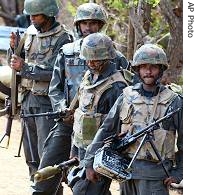2006年VOA标准英语-Sri Lanka Ceasefire Monitors Blame Government T(在线收听)
By Patricia Nunan
New Delhi
30 August 2006
 Government soldiers patrol on the Mavilaaru reservoir tank bank in Mavilaaru, close to Muttur, Sri Lanka, Monday, August 28, 2006 |
||
-----
Ceasefire monitors say the Sri Lankan military was the only armed group in the eastern town of Muttur when the August 4 massacre took place.
Therefore, the observers from the international Sri Lanka Monitoring Mission, or SLMM, say security forces had to be responsible for the deaths.
The massacre was one of the most brutal incidents in weeks of sporadic clashes between the government and Tamil Tiger rebels. The violence threatens to return the country to the civil war waged for 20 years over the rebels' demand for a separate homeland for the country's ethnic Tamil minority.
The aid workers were with the French organization, Action Against Hunger, and most were ethnic Tamils. Fifteen were found lying face down in the group's compound in Muttur. Witnesses say they were shot in the back of the head, execution-style. Two others were found dead in a car, apparently murdered while trying to escape.
The SLMM released the findings of their investigation into the incident Wednesday. The group says it was prevented from reaching Muttur for security reasons immediately after the massacre. They base their findings, they say, on reliable sources.
The government has denied its forces had anything to do with for the deaths and has begun its own investigation into the incident.
James Ross, a senior legal adviser with the group Human Rights Watch, says that often, government investigations are not good enough.
"One of the main problems that we've found in Sri Lanka over the years is the issue of impunity - of serious crimes being committed and no serious action taken," said Ross. "Now there's been an investigation announced, but we've seen that before, where there's an investigation, and it just slowly fades away, it never gets concluded. And no one is prosecuted, and no one is convicted and sent to prison for serious crimes."
Ross says the massacre and other cases of violence against civilians should compel the international community to consider sending United Nations human rights monitors to Sri Lanka.
But it is unlikely a new group of international observers will be deployed any time soon.
Thursday is the deadline set by the Tamil Tigers for nearly half of the 57 ceasefire monitors to leave Sri Lanka. The rebels declared that monitors from European Union countries can not stay because the EU has named the group a terrorist organization.
The SLMM observers were deployed after the government and the Tamil Tigers signed a ceasefire in 2002, which now some say exists in name only.